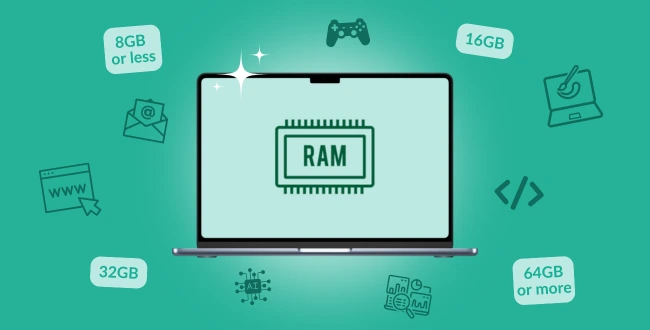19/03/2025

How Much RAM Does Your Laptop Need?
When buying a laptop, you will almost always come across the term RAM (Random Access Memory). But what exactly does RAM do? How much do you need for your usage? And is it better to upgrade your RAM or buy a new (refurbished) laptop? In this blog, you’ll find everything you need to know to make the right choice.
A laptop with limited RAM will slow down more quickly, especially when handling demanding tasks like video editing or gaming. That’s why it’s important to know how much memory you actually need.
Additionally, there are different generations, such as DDR3, DDR4, and DDR5. Newer versions like DDR4 and DDR5 are faster and more efficient than DDR3, but they are not compatible with each other. This means you always need to choose RAM that is compatible with your laptop.
Professionals who work with heavy software or virtualisation require even more powerful memory. Below, you can see which RAM capacity is suitable for different tasks.

A refurbished laptop often provides the best value for money. At Refurbished Direct, you’ll find laptops with various RAM options, making it easy to choose a model that suits your needs.

If you’re unsure whether to upgrade or buy a new laptop, check if your laptop is upgradeable and weigh the advantages of a new (refurbished) laptop.
Table of Contents
- What is RAM?
- Different types of RAM
- How much RAM do you need?
- Slow laptop? Here are your options!
- Conclusion
- Frequently Asked Questions
What is RAM?
RAM, or Random Access Memory, is a temporary storage that your laptop uses to hold data needed for active processes. This means that if you open multiple programs or browser tabs at the same time, your RAM determines how smoothly everything runs. The more RAM you have, the better your laptop can handle multitasking.A laptop with limited RAM will slow down more quickly, especially when handling demanding tasks like video editing or gaming. That’s why it’s important to know how much memory you actually need.
Different types of RAM
There are two main types of RAM: SODIMM and DIMM. SODIMM memory is smaller and used in laptops and MacBooks, while DIMM memory is larger and designed for desktop computers.Additionally, there are different generations, such as DDR3, DDR4, and DDR5. Newer versions like DDR4 and DDR5 are faster and more efficient than DDR3, but they are not compatible with each other. This means you always need to choose RAM that is compatible with your laptop.
How much RAM do you need?
The amount of RAM you need depends on how you use your laptop. For basic tasks like browsing the internet and emailing, a small amount of RAM is sufficient. However, if you frequently run multiple programs at once, edit photos, or play games, you will need more.Professionals who work with heavy software or virtualisation require even more powerful memory. Below, you can see which RAM capacity is suitable for different tasks.

Slow laptop? Here are your options!
Noticing that your laptop is slow, programs open slowly, and multitasking is a struggle? This may be due to insufficient RAM. Sometimes, upgrading the RAM can help, but in other cases, a new or refurbished laptop might be a better choice. The best option depends on your current RAM and whether your laptop is upgradeable.Checking Your Current RAM
Before deciding whether to upgrade your RAM or buy a new laptop, it’s useful to know how much memory you currently have.- Windows: Press Ctrl + Shift + Esc to open the Task Manager. Go to the Performance tab and click on Memory. Here you will see how much RAM your laptop has and how much is in use.
- Mac: Click on the Apple logo in the top-left corner and select About This Mac. Under the Overview tab, you will see the amount of memory in your MacBook or iMac.
Upgrade or a New (Refurbished) Laptop?
Some laptops allow you to add extra RAM, but many modern models, especially MacBooks, do not. So, check first whether your laptop is upgradeable.A refurbished laptop often provides the best value for money. At Refurbished Direct, you’ll find laptops with various RAM options, making it easy to choose a model that suits your needs.

Conclusion
RAM plays a major role in how fast and smoothly your laptop performs. Choose the right amount of RAM based on your usage: for basic tasks, 8GB is often sufficient, while professionals and gamers should opt for 16GB or more.If you’re unsure whether to upgrade or buy a new laptop, check if your laptop is upgradeable and weigh the advantages of a new (refurbished) laptop.
